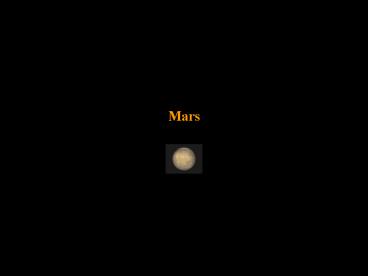Mars PowerPoint PPT Presentation
1 / 21
Title: Mars
1
Mars
2
Physical Properties of the Earth and Mars
3
Global View of Mars
Sunlight at Mars is only 0.43 as bright as
sunlight at Earth.
Atmospheric pressure is only one-hundredth of
that on earth.
Polar icecaps consist of frozen carbon dioxide
(dry ice) on the top with water ice under it.
Why is Mars atmosphere so thin?
4
Mars Topography
5
The Tharsis Bulge
What caused the Tharsis bulge?
6
Valles Marineris
7
Valles Marineris Compared to Grand Canyon
8
Olympus MonsThe Largest Shield Volcano in the
Solar System
What is it about this volcano that demonstrates
that Mars has a thicker crust than Earth?
Why does it have a thick crust while Earths
crust is relatively thin?
9
Olympus Mons Compared with Mount Everest
Why is Olympus Mons so much larger than Mauna Kea?
10
Mars Rover Spirit Image of Mazatzal
What causes the reddish color of the soil and
rock coatings?
11
Outflow Channel Tiu Vallis - Evidence for Water
on Mars
Source of water seems to be the chaotic terrain
shown in the closeup view below.
12
Erosion in Outflow Channel Ares Vallis
13
Mangala Vallis Source
Source appears to be a deep crack in the crust.
14
Long, Winding Valley Nirgal Vallis
15
Small Valley Network
16
Rock Outcrop at Meridii Planum(Opportunity Image)
Presence of sulfates in the rocks suggests that
they were covered by a salty, acidic ocean for an
extended time long ago.
17
Opportunity Image of a Rock in Gusev Crater
Bright material in cracks and crevices is
suspected of being crystals formed in water.
18
Blueberries Containing Hematite
Hematite, a mineral containing iron, is usually
formed in a wet environment. These small spheres
may have crystalized out of water that contained
dissolved iron compounds.
These have been found in Gusev crater by NASAs
Rover Opportunity.
19
History of Mars
- Accretion ? heating ? melting
- Differentiation
- Cooling ? formation of a crust
- Outgassing of CO2, H2O, N2, etc.
- Impact cratering
- Flooding by lava and water
- Escape of low atomic mass, volatile elements such
as H and He. - Breaking up of water molecules by ultraviolet
radiation, followed by escape of the H2 and the
combination of the O2 with metals to form metal
oxides such as iron oxide (rust). - Thin CO2 atmosphere incapable of producing a
significant greenhouse effect. - Water survives as permafrost, one component
(along with dry ice) of polar icecaps, and
possibly some underground sources. - Dust storms in thin atmosphere cause gradual
erosion.
20
Phobos and Deimos
Dimensions 28 km 20 km Orbital period 0.3189
days Orbital radius 9380 km
Dimensions 16 km 12 km Orbital period 1.262
days Orbital radius 23,500 km
For an observer on Mars, why does Phobos rise in
the west and set in the east?
Why is Deimos smoother than Phobos?
21
Asteroid Gaspra
Dimensions 19 km x 12 km x 11 km
How are Phobos, Deimos, and Gaspra alike?

